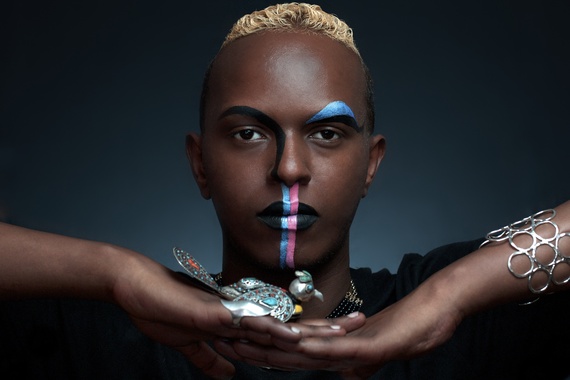There is a Zulu philosophy called "Ubuntu", which literally translates as "humanness". Desmond Tutu broke down this philosophy by adding definition, texture and tone to its rhythm. He explained it as such: "Ubuntu speaks particularly about the fact that you can't exist as a human being in isolation. It speaks about our interconnectedness. You can't be human all by yourself, and when you have this quality -- Ubuntu -- you are known for your generosity."
For me, no one embodies the qualities of "Ubuntu" like my mother. When I was growing up in Nairobi, Kenya in the Nineties, we had a German neighbor called Peter. Peter was in his sixties at the time and a Hells Angel with a serious appetite for strong booze, Harley Davidsons and prostitutes. He had left his wife and only daughter in Berlin decades earlier, choosing instead to settle in a nondescript suburb of Nairobi. Peter ran a successful nightclub in the city, which was frequented by wealthy Westerners and striking-looking sex-workers who had fled from different parts of the continent -- Congo, Cameroon, Burkina Faso -- for a better life in Kenya. Every weekday morning, when we were heading to school, we would see Peter trudging drunkenly to his front door with a different woman in tow after a night out on the town.
As a child I was perplexed by the way these women were so quickly disposed of, replaced with a brand-new substitute every morning. All that changed when Sonia stepped onto the scene. She was a young Ethiopian woman who had the bone structure of a model and the swagger of a razor-sharp hustler. No-one knew whether she was a prostitute or a just a good time girl. All we knew was that Sonia was not a one-night stand. We accepted her as Peter's partner and carried on with the minutiae of our lives.
They had a seemingly happy relationship and over the years Sonia became an integral part of our close-knit community. Everything changed one night when we heard Sonia screaming at Peter. She stood outside their house with black trash-bags stuffed with clothes at her feet and cussed him. Peter, at this point, was looking gaunt, depressed and tired. He quietly shuffled back into his house leaving Sonia screaming slurs at him until finally she wore herself out and grabbed her bags and left for good.
My mother went to check up on Peter that night and we soon learnt that he was dying from AIDS. The entire neighborhood instantly withdrew from him in revulsion. My mother, however, went to see him every day. She kept him company, cooked for him and shared stories to lift his mood. When Peter was eventually hospitalized, my mother would wait impatiently for my father to come home after work so that they could drive down to see him. Peter's family in Germany didn't want to have anything to do with him. He had abandoned them all those years ago and they were still clinging to their anger, not caring that the man was dying from a cruel and dehumanizing disease. In the end, the only person at his bedside when he died was my mother.
It was only when I grew up that I fully understood the extent of my mother's kindness and courage. As Somalis, our mainstream culture is modeled on extremely orthodox and conservative values. There are only straight lines. Coloring outside the box is taboo, and when I was younger and Peter was dying, people were quick to remind my mother that she was stepping out of line to help him. I once asked her why she did it, why she helped Peter in the face of tremendous hostility from our family members and community. Her answer was straightforward. "This man is a human being. It is my Islamic duty to help him."
Years later, after I came out as gay to my family, most of them were quick to disown me. My mother, however, refused to give up on me. I had always imagined that my father -- a liberal former professor -- with his multiple degrees, cosmopolitan savvy and fluency in five languages would be supportive. But in an eerie parallel to the way our neighbors in Nairobi had reacted when they first heard that Peter was dying from AIDS, my father recoiled from me in disgust when I came out. Echoing the same generosity of spirit and loyalty that she had once shown Peter, my mother, who did not possess multiple degrees or fluency in five languages, stood by me again and again whilst facing pressure from everyone around her.
My mother reminds me everyday that human kindness and empathy have no borderlines. This is not an abstract conceit mired in convoluted politics. It's an elementary part of being cognizant and alive. I'm proud of the life I have built for myself from the detritus of trauma and rejection. I've grown up to become exactly the man I dreamt I would be when I was a child. I thank my mother for lighting the way. Diriye Osman's critically-acclaimed collection of short stories about the LGBT Somali experience, "Fairytales For Lost Children", is out now and available on Amazon.

